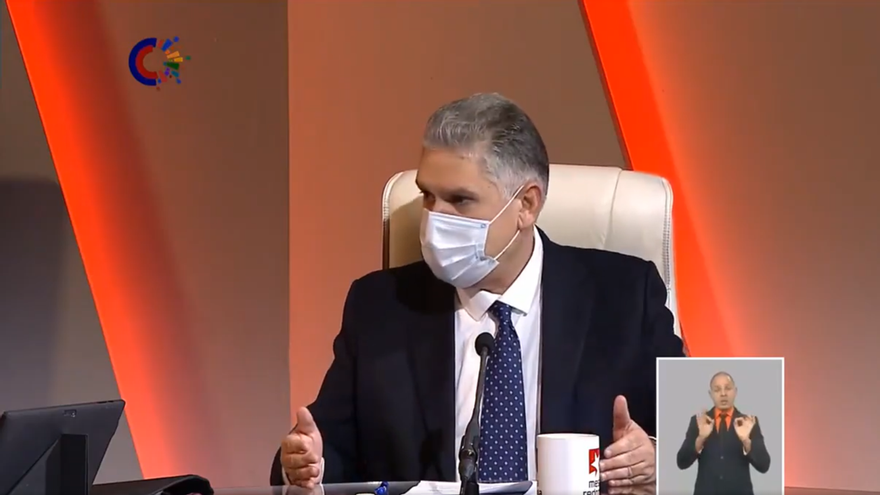
![]() 14ymedio, December 4, 2020 — Economy and Planning Minister Alejandro Gil Fernandez appeared on Thursday’s “Roundtable” State TV program in an effort to calm the growing popular discontent over hard-currency stores. His words, however, had the opposite effect.
14ymedio, December 4, 2020 — Economy and Planning Minister Alejandro Gil Fernandez appeared on Thursday’s “Roundtable” State TV program in an effort to calm the growing popular discontent over hard-currency stores. His words, however, had the opposite effect.
The minister’s statements outraged many Cubans, who expressed disagreement on the streets and in social media. Most disconcerting was Gil’s assertion that the decision to open hard-currency stores to sell groceries and cleaning products in July was “a decision of social justice and socialism.”
“An undersupplied market does not attract foreign currency,” the minister explained, referring to what many Cubans describe as “monetary apartheid,” which divides society into those who have dollars to buy products in these stores, known locally as MLCs, and those who must make do with the network of stores selling goods in the Cuban pesos (CUP).
“The way you acquire [hard currency] is to sell things in freely convertible foreign currency in order to be able to redistribute and guarantee a minimum level of supply in the national currency, which we know is very limited and far from meeting consumer demand,” explained Gil, who alluded to the supposedly “high and medium range” products these stores offer.
Cubans complain, however, that both convertible peso (CUC) stores and foreign currency stores suffer from shortages. In stores whose merchandise can only be purchased with magnetic debit cards denominated in dollars or other foreign currencies, customers must wait in long lines. Popular items are also often sold out by noon or can never be purchased at all.
“I waited in line for three hours at the hard-currency store on the corner of Boyeros and Camaguey [in Havana]. I was part of the second group that was let in, around 10:00 AM,” says a regular customer of one of these stores. “The only things they had in the meat section were Gouda cheese and some very expensive imported shrimp. No meat, no ground beef, no sausage.”
A resident of Santiago de Cuba had a similar experience and told 14ymedio that after spending a month looking for certain grocery items, she went to MLC stores believing she would find them there. “All they had was some very expensive cheese and mortadella, nothing else,” she observed.
After Gil’s appearance on television on Thursday, a young man in Old Havana expressed disagreement with the minister’s statements: “He flat out tells us, ’Oh, you don’t want MLC stores? Well, then no more bread or milk.’ It’s insulting. My God, it’s immoral.”
In response to Gil’s arguments, the Cuban economist Pedro Monreal claimed on social media shortly after the television appearance, “It is not necessary to price consumer goods in hard currency in order to acquire hard currency. That is done at currency exchange bureaus and banks.”
“This is not about having well-stocked CUC stores. I say, let’s start selling for dollars the things we used to sell for CUCs,” said the minister. He justified the policy by saying that government resources “are directed mainly at acquiring medicines, food and cleaning products as well as in supporting the energy sector.”
Among other issues, Gil noted that MLC stores arose due to a concern among the Cuban public over the growth of a “parallel market of Cuban nationals who traveled abroad and brought back products that the country was not able to offer in its CUC stores.”
According to the minister, the public asked that “something be done because hard currency was not being tapped. It was not benefitting the nation’s industry and we were not attracting dollars for the country’s economic and social development.”
But in his analysis, Monreal claims, “Undersupplying CUC/CUP stores is not a good mechanism for currency allocation. It is a deficiency in distribution, not a way to build hard currency reserves.” To the economist, operating MLC stores in a country planning on doing currency unification is a contradiction.
The economist argues that the sale of food and personal hygiene products for hard currency creates “a closed retail loop disconnected from the work efforts of most employees, gradually disincentivizing the work ethic.”
____________
COLLABORATE WITH OUR WORK: The 14ymedio team is committed to practicing serious journalism that reflects Cuba’s reality in all its depth. Thank you for joining us on this long journey. We invite you to continue supporting us by becoming a member of 14ymedio now. Together we can continue transforming journalism in Cuba.
